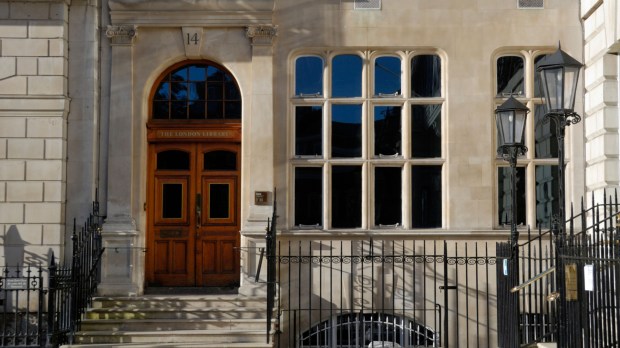When I went to Poland not long before Covid, I found a country more bitterly divided by a culture war even than we are. So I would not rule out EU leaders being right that the current government there has intruded on the independence of the judiciary for its own political ends. This is the background to recent Brussels fury that the Polish Constitutional Tribunal (supreme court) asserted the primacy of Polish law over that of the EU earlier this month. The problem never arises in the EU, of course, because there the European Court of Justice has never had an independent judiciary to be tampered with. It has aways been the purpose of the ECJ to make sure that its judges use European law to advance the European Union, which democracy tends not to. In that sense, all its judges are political. Which is why we in Britain had to break free from the ECJ and why the Northern Ireland Protocol can never be fairly enforced by it. ‘Poles apart’ is the slogan we should use to support that country, so often ruled by others, as it tries to reclaim sovereignty.
Like Her Majesty the Queen and President Xi Jinping, I have decided not to attend COP26 this weekend. I live a long way from Glasgow and I do not want to increase my carbon footprint by making the journey when the green alternative is increasing my horse’s footprint down south. So here, instead, is a brief thought about heat pumps. They may, or may not, make a contribution to achieving net zero. What they will certainly do is add to noise pollution. Heat pumps hum and whirr, so much so that websites advise people not to install them near their bedrooms. Unlike boilers, they need to stay on more or less all the time in colder months. Imagine, in a pumped-up future townscape, the night-time drone in every street emitted by every heat pump. Heat pumps can also double up as air-conditioning units. At present, very few houses and flats in Britain have air conditioning. If they can get it easily through heat pumps, this will lead to an overall increase in energy consumption. Eventually, it will encourage the worse construction of new houses because they will no longer require natural ventilation.
I was honoured but embarrassed to be asked to speak at the recent launch of Charles Guthrie’s memoirs (Peace, War and Whitehall). As a journalist, not a soldier, I am not fit to sum up the life of the first non-royal field marshal of the 21st century. But I took courage from the fact that, in the book, Guthrie makes a point of how important it is for leaders of the armed services to engage the widest range of people. Unfashionably, he speaks up for the concept of ‘networking’, putting it second only to ‘credibility’ as a necessary attribute for commanders. ‘If you aspire to high command,’ he writes, ‘you must build your own constituency. You need to be both seen and heard… A bit of showmanship is no bad thing in senior officers.’ As editor and writer, I have been the beneficiary of this approach, and noticed how few people in the armed services are good at it. Kingsley Amis famously said that the worst phrase in the English language was: ‘Shall we go straight in?’ For Charles Guthrie, it is ‘sandwiches at the desk’. His idea of leadership involves knowing people, trusting them and projecting, and thus inspiring confidence. This will certainly involve lunch, dinner, sports and alcohol more than the details of defence white papers. Although he is a genuine man of action, Guthrie has always understood that aspect of leadership which involves ‘being’ more than ‘doing’. This is little understood now, so there are few suitable future field marshals to be seen.
There was an exciting, almost theological moment in last week’s Lords debate on ‘assisted dying’ (I use inverted commas because the right word in this context is ‘suicide’ not ‘dying’). My old friend Nigel Vinson claimed that when, on Golgotha, the centurion pierced Jesus’s side with his spear, he was performing ‘assisted dying’. Could the Christian story thus be reinterpreted in support of Lady Meacher’s Private Member’s Bill? No, was the short answer in my head, but I couldn’t remember the text exactly enough to pass it along to whichever opponent of the Bill was next to speak. Luckily, in summing up, the Bishop of Durham briefly corrected Lord Vinson. I checked afterwards. The story appears only in John’s Gospel. In his account, the soldiers broke the legs of the other crucified men (as was customary in order to guarantee death), but in the case of Jesus, they ‘saw that he was dead already, they brake not his legs’. Nevertheless, ‘one of the soldiers with a spear pierced his side, and forthwith came there out blood and water’ (in fulfilment of a prophecy of Zechariah). Christ died unassisted. So if the House had divided (which it didn’t) and if Our Lord had been entitled to vote (which he wasn’t, being a different sort of Lord), we of the Not Content party could probably have counted on his support.
Lionel Shriver is right that the logic of those who attack ‘cultural appropriation’ is that no one should write novels. In this respect, if in no other, the wokeists agree with Nancy Mitford’s Uncle Matthew, who wept bitterly while reading Tess of the D’Urbervilles but then, on discovering that it was fiction, exclaimed: ‘What? Do you mean the damn sewer invented it?’ The idea that ‘lived experience’ is the only valid form of experience there is strikes at a major purpose of novels, which is to imagine experiences which may not have been lived by reader or even author. It would certainly abolish all historical novels describing periods beyond living memory. I would go one further than Lionel Shriver and add that learning and speaking a language derived from an ethnicity different from your own is surely an even more severe form of cultural appropriation. The only woke way fully to respect a different culture is to admire it in monoglot silence.
Got something to add? Join the discussion and comment below.
Get 10 issues for just $10
Subscribe to The Spectator Australia today for the next 10 magazine issues, plus full online access, for just $10.
You might disagree with half of it, but you’ll enjoy reading all of it. Try your first month for free, then just $2 a week for the remainder of your first year.















Comments
Don't miss out
Join the conversation with other Spectator Australia readers. Subscribe to leave a comment.
SUBSCRIBEAlready a subscriber? Log in